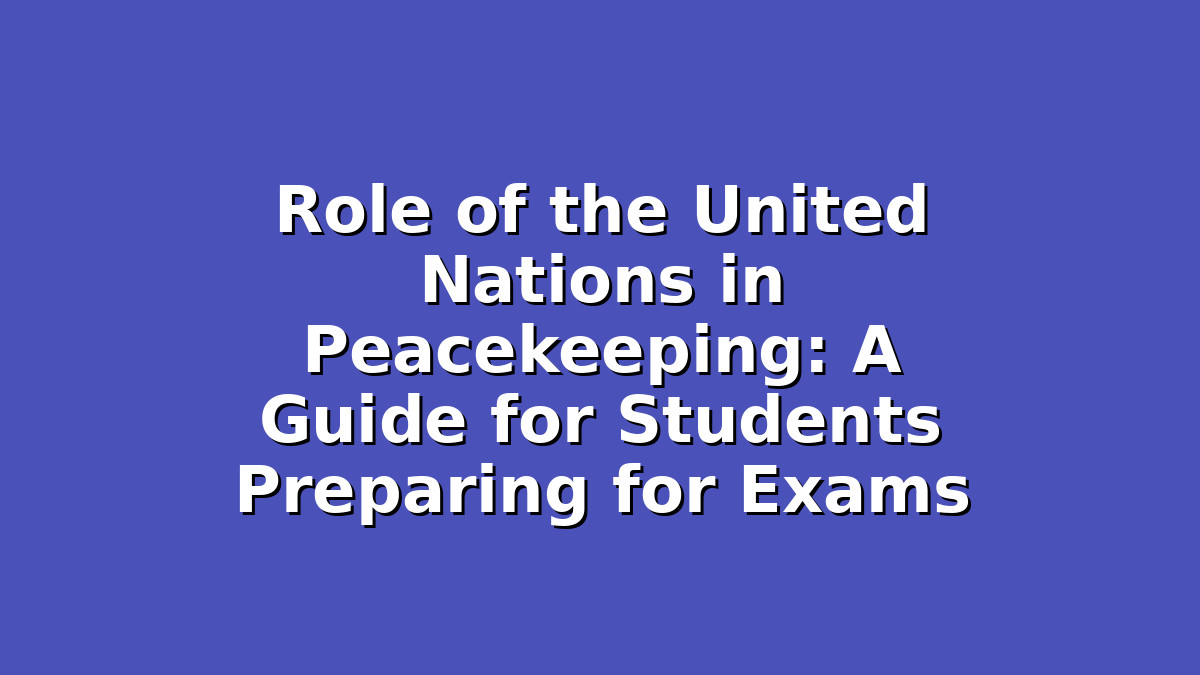Introduction
If you are a student preparing for exams, especially in subjects like history, political science, or international relations, understanding the role of the United Nations (UN) in peacekeeping is essential. The UN has played a significant role in maintaining global peace and security since its establishment in 1945. As you study this topic, you will uncover how peacekeeping missions work, why they matter, and how the UN adapts to new global challenges. This article will guide you through the crucial aspects of UN peacekeeping, along with helpful study tips to make your revision more effective and enjoyable.
Section 1: Understanding the Basics of UN Peacekeeping
The United Nations peacekeeping operations are one of the most visible and practical ways the UN promotes peace globally. At its core, peacekeeping involves deploying international personnel, including military troops, police, and civilian staff, to conflict zones to help maintain ceasefires and create conditions for lasting peace.
Key Concepts to Focus On:
– Mandate: Every peacekeeping mission operates under a mandate approved by the UN Security Council, which outlines its objectives and rules of engagement.
– Principles of Peacekeeping: These include consent of the parties involved, impartiality, and non-use of force except in self-defense or defense of the mission.
– Types of Missions: Peacekeeping missions can include monitoring ceasefires, disarming combatants, supporting elections, and protecting civilians.
Study Tip: Create flashcards with key terms such as “mandate,” “consent,” and “impartiality.” This active recall technique helps solidify your understanding of foundational concepts. Try to summarize each concept in your own words to ensure you grasp their meanings.
Section 2: Key Historical UN Peacekeeping Missions and Their Impact
To better understand how the UN operates in real-world situations, it’s useful to study some important peacekeeping missions. These examples help you see the challenges and successes of the UN’s peacekeeping efforts.
– The Suez Crisis (1956): The UN Emergency Force (UNEF) was the first-ever peacekeeping mission, deployed to resolve the conflict between Egypt, Israel, Britain, and France.
– The Congo Crisis (1960-1964): One of the largest early missions aimed to stabilize the newly independent Congo amidst civil war.
– Bosnia and Herzegovina (1992-1995): Peacekeepers worked to protect civilians during the breakup of Yugoslavia.
– South Sudan (2011-Present): The UN Mission in South Sudan (UNMISS) supports peace-building efforts in Africa’s newest nation.
Study Tip: Use timelines and maps to visualize when and where these missions took place. Drawing timelines helps you sequentially organize events, while maps connect geographical context to the missions. Try quiz apps or practice questions that test your knowledge of these missions’ objectives and outcomes.
Section 3: How to Apply This Knowledge Effectively in Exams
Knowing the facts is just one part of exam success; you also need to apply your knowledge analytically and write clearly.
Tips for Exam Preparation:
– Understand the Role and Limitations: Recognize that UN peacekeeping is not perfect. Missions sometimes face criticism due to limited resources, challenging political situations, or lack of cooperation from conflicting parties.
– Use Case Studies: Whenever possible, support your answers with specific examples from peacekeeping missions. For example, explain how the UN helped maintain peace in a particular country and what challenges it faced.
– Practice Writing Answers: Write short essays or paragraphs summarizing the role of the UN in peacekeeping. Focus on clarity, structure, and using keywords like “Security Council,” “consent,” and “impartiality.”
– Connect to Current Events: Stay updated on ongoing peacekeeping operations or new challenges, such as terrorism or cyber threats. This shows deeper understanding and relevance.
Study Tip: Form study groups where you discuss and quiz each other on UN peacekeeping topics. Teaching others is one of the best ways to reinforce your learning and identify areas you need to improve.
Conclusion
The United Nations’ role in peacekeeping is a vital part of maintaining international peace and security. For students preparing for exams, mastering this topic can be rewarding and intellectually stimulating. By focusing on the basics, studying significant missions, and practicing application through writing and discussion, you can confidently tackle questions on the UN’s peacekeeping efforts. Remember to stay curious and use various study techniques to keep your preparation engaging and effective. Your dedication will not only help you succeed in exams but also deepen your understanding of global affairs.

Responses